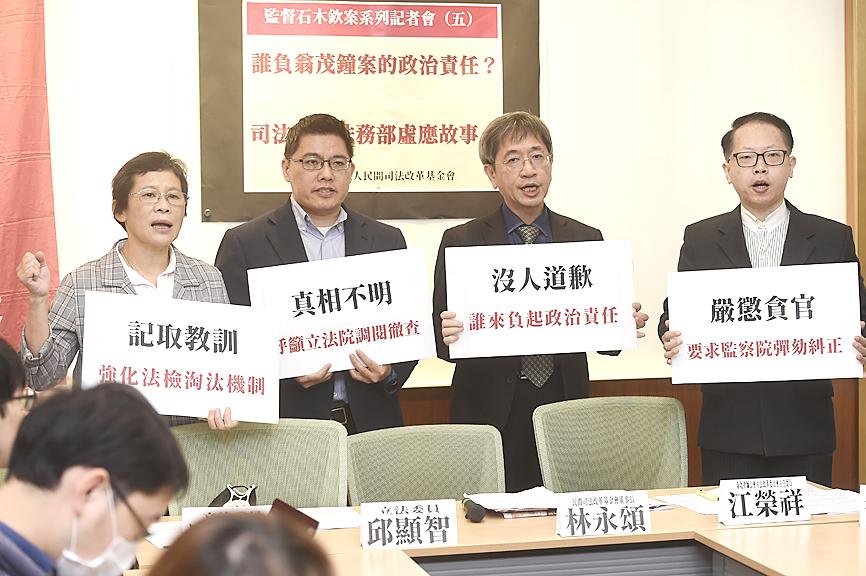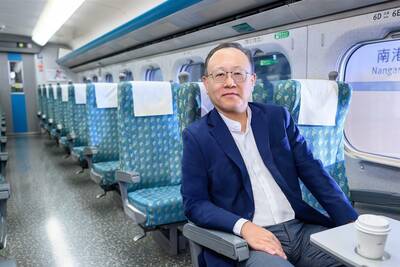Judicial reform advocates and lawmakers yesterday criticized reports on alleged bribe-taking, abuse of authority, and other misconduct by judges and prosecutors in a corruption scandal involving business tycoon Weng Mao-chung (翁茂鍾) and former Supreme Court judge Shih Mu-chin (石木欽).
The Judicial Reform Foundation and New Power Party (NPP) legislators said that the reports presented on Wednesday by the Judicial Yuan and the Ministry of Justice about the scandal concealed information to shield high-ranking members of the judiciary.
Judicial Reform Foundation chairman Lin Yung-sung (林永頌), and NPP legislators Chiu Hsien-chih (邱顯智) and Chen Jiau-hua (陳椒華) told a news conference in Taipei that they were disappointed with the content of the reports into the results of a second-stage investigation into the scandal.

Photo: Chien Jung-fong, Taipei Times
They held signs with slogans such as: “Corrupt officials must be punished” and “No one took political responsibility.”
They said that a mechanism was needed to dismiss judges tainted with corruption.
Judicial Yuan President Hsu Tzong-li (許宗力) must make a public apology, as there are numerous deficiencies in its report, they said, adding that it had failed to declare an appropriate punishment.
Moreover, Hsu has failed to implement real judicial reform, a goal President Tsai Ing-wen (蔡英文) had promised to achieve, they said.
“In the Judicial Yuan’s second-stage report, it investigated 37 judges and high-ranking judicial officials, of whom 26 were found to have accepted bribes or illegal financial benefits from Weng, among other misconduct with grounds for punishment,” Lin said.
“However, the report said that no action would be taken against 25 of them, because the statute of limitations has expired,” he said.
The report named only one figure, a judge at the Supreme Administrative Court, to be included in the Control Yuan’s probe, which might result in impeachment or simply a reprimand, Lin said, adding that most people would not accept such a result.
Chiu said that he and other lawmakers were disappointed in the two reports, which did not provide details on the extent of the alleged bribe-taking, financial benefits, expensive gifts, and meetings and banquets that Weng arranged.
The public has lost trust in the nation’s judicial system after learning that Weng had received favorable rulings in cases against him, Chiu said.
It seems to most people that Weng had bought the judges, he said.
“The Judicial Yuan and the ministry must be held accountable to our nation’s citizens, and must apologize for this serious scandal, which has done grave damage to the judicial system,” Chiu said, adding that he would push for subsequent investigations and reports by the Legislative Yuan and the Control Yuan to be made public.
Chen said that the government must establish a proper mechanism to dismiss judges found to have contravened the law or performed below standards.
After passing their qualifying exams, judges basically have the job until they retire, and very few are subjected to the impeachment process or internal reviews by the Judicial Yuan’s disciplinary committee, she said.
Shih was impeached in August last year after an earlier investigation by the Control Yuan found that he was involved in conflict of interest and insider trading for many years and maintained a friendship with Chia Her Industrial Co president Weng, even after Weng was embroiled in legal disputes.
The Control Yuan said that Shih did not recuse himself when Weng appeared before the court and allegedly provided him with legal advice on the side.
Weng conducted illicit activities with more than a dozen high-level judicial and police officials for personal gain, the Control Yuan said at the time.
Legal experts and media reports have called the case “the biggest corruption scandal in the history of Taiwan’s judiciary,” with more than 200 officials — including judges, prosecutors, investigators, military and police officials, and some political figures — allegedly involved.

The inspection equipment and data transmission system for new robotic dogs that Taipei is planning to use for sidewalk patrols were developed by a Taiwanese company, the city’s New Construction Office said today, dismissing concerns that the China-made robots could pose a security risk. The city is bringing in smart robotic dogs to help with sidewalk inspections, Taipei Deputy Mayor Lee Ssu-chuan (李四川) said on Facebook. Equipped with a panoramic surveillance system, the robots would be able to automatically flag problems and easily navigate narrow sidewalks, making inspections faster and more accurate, Lee said. By collecting more accurate data, they would help Taipei

STATS: Taiwan’s average life expectancy of 80.77 years was lower than that of Japan, Singapore and South Korea, but higher than in China, Malaysia and Indonesia Taiwan’s average life expectancy last year increased to 80.77 years, but was still not back to its pre-COVID-19 pandemic peak of 81.32 years in 2020, the Ministry of the Interior said yesterday. The average life expectancy last year increased the 0.54 years from 2023, the ministry said in a statement. For men and women, the average life expectancy last year was 77.42 years and 84.30 years respectively, up 0.48 years and 0.56 years from the previous year. Taiwan’s average life expectancy peaked at 81.32 years in 2020, as the nation was relatively unaffected by the pandemic that year. The metric

TAKING STOCK: The USMC is rebuilding a once-abandoned airfield in Palau to support large-scale ground operations as China’s missile range grows, Naval News reported The US Marine Corps (USMC) is considering new sites for stockpiling equipment in the West Pacific to harden military supply chains and enhance mobility across the Indo-Pacific region, US-based Naval News reported on Saturday. The proposed sites in Palau — one of Taiwan’s diplomatic allies — and Australia would enable a “rapid standup of stored equipment within a year” of the program’s approval, the report said, citing documents published by the USMC last month. In Palau, the service is rebuilding a formerly abandoned World War II-era airfield and establishing ancillary structures to support large-scale ground operations “as China’s missile range and magazine

Passengers on Taiwan High Speed Rail (THSR) will be required to use headphones and make phone calls in gangways under new “quiet travel” rules starting Sept. 22. THSR Chairman Shih Che (史哲) told media that THSR will run a three-month promotional campaign to ensure widespread adoption of the new rules. Those repeatedly ignoring the guidance face the potential termination of their transport contract, which can result in them getting escorted off the train, according to THSR. Shih shared his hope to cultivate an environment conducive to rest and reading for the train’s passengers, stating that these changes aim to “promote self-discipline” among passengers